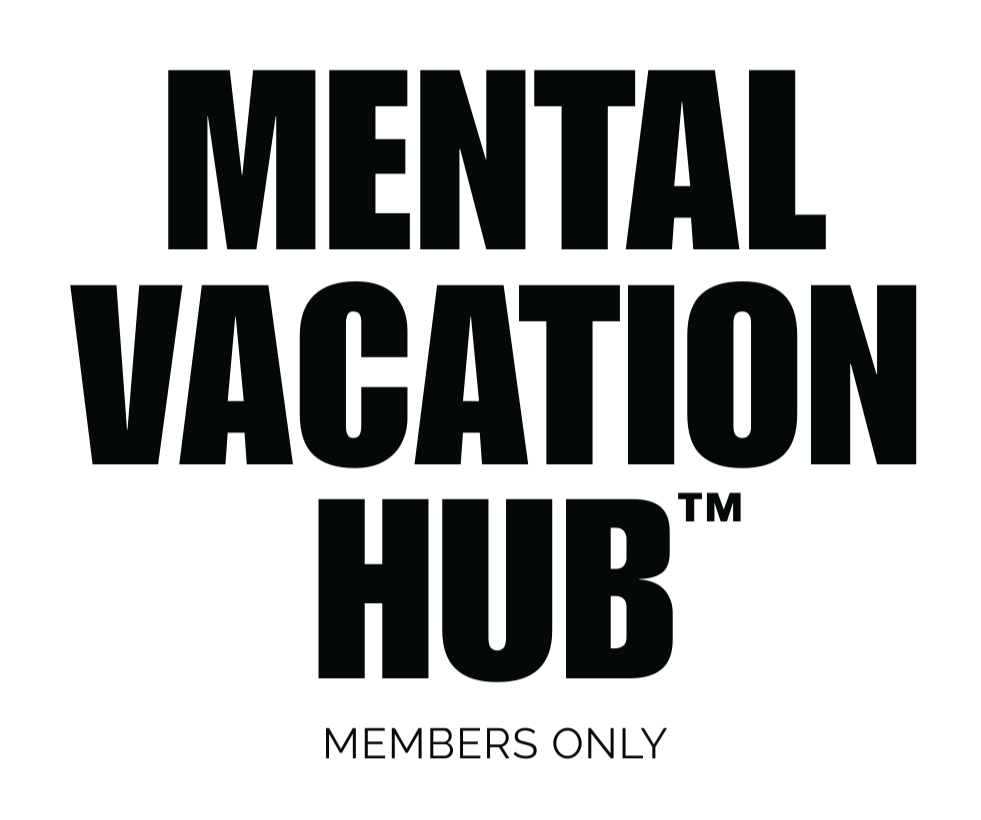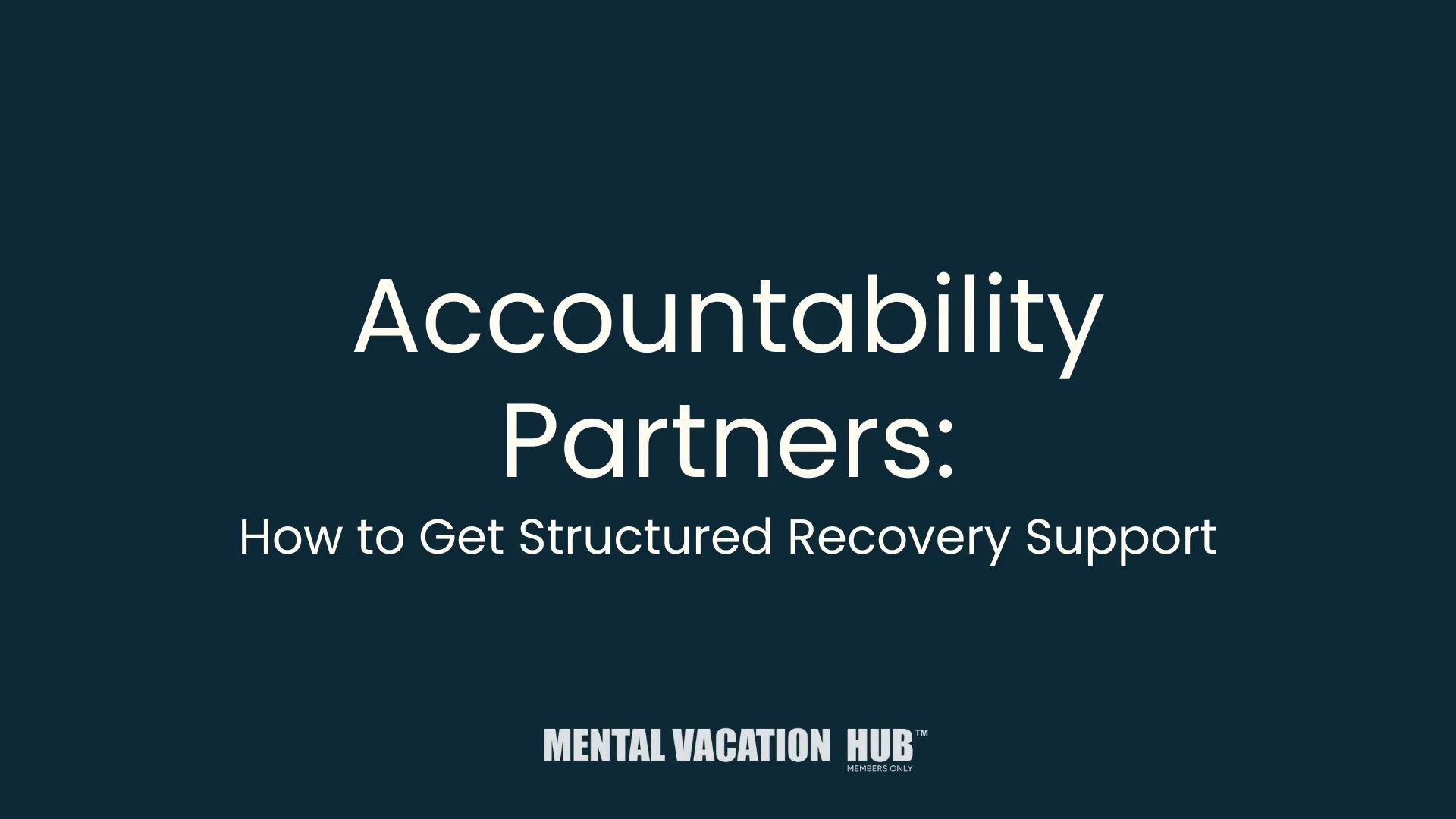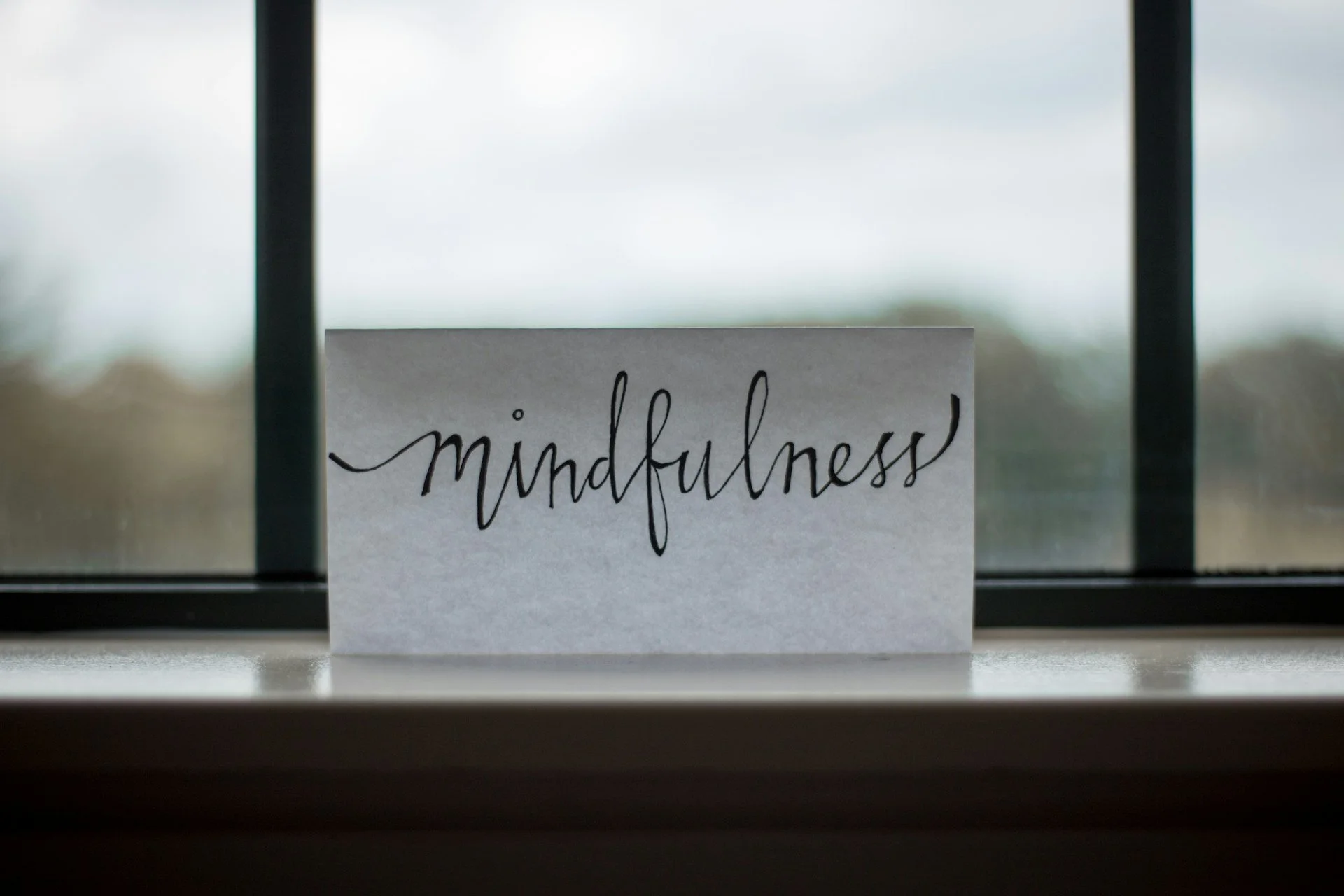Accountability Partners: How to Get Structured Recovery Support
Recovery intentions are easy.
Following through is hard. The person knows they need to set boundaries, rest more, and build sustainable habits. But when exhausted and overwhelmed, following through on these commitments feels impossible.
Motivation disappears. Old patterns return. Recovery stalls.
Accountability partners provide external structure when internal motivation fails.
They check in regularly. They ask about commitments. They notice when someone is slipping back into burnout patterns.
This external accountability creates consistency that self-discipline alone often can't maintain during recovery.
An accountability partner isn't a therapist or coach. They're a peer who provides structure, encouragement, and honest feedback.
The relationship is mutual. Both people support each other's recovery or goals.
This reciprocity makes the partnership sustainable and prevents it from feeling one-sided.
This post covers what accountability partners do, how to find one, and how to structure the partnership for effective burnout recovery support.
What Accountability Partners Actually Do
Understanding the role clarifies what to look for and how to structure the partnership effectively.
Accountability partners provide regular check-ins on specific commitments. They ask about goals set in previous conversations.
Did you maintain your boundary?
Did you take the planned rest day?
Did you complete the recovery practice?
These check-ins create external pressure to follow through when internal motivation wavers.
They notice patterns you might miss. When you're in burnout, self-awareness is often impaired. Your partner can observe patterns like overcommitting, ignoring warning signs, or rationalizing unhealthy choices.
This outside perspective provides valuable feedback that's difficult to see from inside the experience.
They celebrate progress and wins that you might dismiss
Recovery progress is often subtle.
Your partner notices and celebrates improvements that you might overlook or minimize. This positive reinforcement maintains motivation when progress feels frustratingly slow.
They ask hard questions without judgment. A good accountability partner asks, "Why did you work through the weekend after committing not to?" without criticism. The question prompts reflection rather than defensiveness. This gentle challenging helps identify obstacles to recovery that you might not recognize on your own.
They also share their own struggles and progress. The relationship is reciprocal. Both people share challenges and successes.
This mutual vulnerability creates safety and prevents the partnership from feeling like supervision or judgment.
They encourage you during difficult periods
Recovery isn't linear.
When you're struggling, your partner offers support and reminds you of progress already made. This encouragement helps maintain momentum through setbacks that might otherwise derail your recovery entirely.
Research from the American Psychological Association shows that accountability significantly increases goal achievement and behavior change, particularly for health-related goals like stress management and lifestyle modification.
Where to Find an Accountability Partner
Finding the right partner requires looking in places where people with similar goals naturally gather.
Burnout recovery communities often facilitate partnerships. Online forums, Facebook groups, or Reddit communities focused on burnout frequently have members seeking accountability partners. These spaces connect people with shared experiences and goals.
The common understanding of burnout makes the partnership more effective from the start.
Professional networks can connect peers in recovery. Industry-specific groups or alumni networks sometimes have wellness or peer support programs. Finding someone in a similar profession creates understanding of work-specific pressures.
The professional context makes advice more relevant and applicable to your actual work situation.
Therapy or coaching groups create natural partnerships
Group therapy or group coaching for burnout connects people at similar recovery stages.
These structured programs often encourage or facilitate accountability partnerships. The professional oversight provides additional support and guidance for making the partnership work.
Existing friends or colleagues might be interested in supporting you. Someone already in your life might be working on similar goals. Proposing an accountability partnership can deepen an existing relationship while providing mutual support.
The established trust makes vulnerability easier and more natural.
Formal accountability partner matching services exist
Platforms like Focusmate or specific accountability apps connect people with partners based on goals and schedules.
These services provide structure and matching algorithms. They're particularly useful when local options are limited or you prefer connecting with someone outside your existing network.
Consider hiring a professional accountability coach
If finding a peer partner is difficult, some coaches specialize in accountability support.
This isn't traditional coaching focused on strategy or insight. It's structured check-ins focused specifically on following through on commitments.
The professional relationship ensures consistency even when peer partnerships are hard to maintain.
How to Structure the Partnership
Clear structure makes accountability partnerships effective rather than vague good intentions that fade after a few weeks.
1.Establish regular meeting times that work for both schedules.
Weekly or bi-weekly check-ins work well for most people.
Consistency matters more than frequency. Scheduled meetings prevent the partnership from fading when life gets busy.
Video calls, phone calls, or even structured text exchanges all work depending on preferences and schedules.
2. Define specific goals and commitments that you can actually measure.
Vague goals like "take better care of myself" are impossible to track.
Specific commitments like "no work email after 7 PM" or "one full rest day per week" are measurable and clear. Each check-in should review specific commitments made in the previous session.
3. Use a shared tracking system that both partners can access.
A shared document, app, or simple text thread where both people record commitments and progress creates accountability between meetings.
Seeing your partner's progress often motivates you to follow through on your own commitments.
4. Set a clear agenda for each meeting to keep conversations focused.
A simple structure keeps meetings productive.
Review commitments from last time, discuss challenges and successes, identify patterns, set commitments for next time, and offer mutual support.
This structure prevents meetings from becoming unfocused venting sessions that don't drive progress.
5. Agree on communication style and boundaries upfront.
How direct should feedback be?
How much contact between meetings is appropriate? What topics are in scope versus out of scope? Clarify these boundaries to prevent misunderstandings and to ensure both people feel comfortable being honest.
6. Commit to a trial period with evaluation built in.
Start with a three-month commitment and evaluate whether the partnership is working.
This trial period allows ending or adjusting the partnership without awkwardness if it's not a good fit.
Successful partnerships can continue indefinitely once you've confirmed the match works.
Making the Partnership Work
Structure alone isn't enough.
Certain practices make partnerships effective long-term rather than fading after initial enthusiasm.
Be honest about struggles and setbacks, even when it's uncomfortable. The partnership only works if both people are truthful. Pretending everything is fine defeats the entire purpose. Admitting when commitments weren't kept allows identifying obstacles and adjusting strategies.
Honesty requires psychological safety, which both partners must actively create.
It is important to focus on patterns rather than individual failures. Missing one commitment isn't the issue, but missing repeatedly the same commitment indicates a pattern worth exploring. Your partner should ask "What's making this particular commitment difficult?" rather than focusing on individual instances of not following through.
Celebrate small wins consistently
Recovery progress is incremental.
Acknowledging small improvements maintains motivation when big changes feel impossibly far away. Your partner should notice and celebrate things like maintaining a boundary once, sleeping better one night, or recognizing a warning sign early.
These small wins compound over time into significant progress.
Adjust commitments based on actual capacity, not ideal capacity. If you consistently can't meet commitments, they might be too ambitious for your current state. Your partner can help identify whether to adjust the goal or address obstacles preventing follow-through. Flexibility prevents the partnership from becoming demoralizing instead of supportive.
Maintain reciprocity and balance in every conversation.
Both people should share roughly equally. If one person dominates every conversation, the partnership becomes unsustainable.
Reciprocity ensures both people benefit and prevents resentment from building. Taking turns going first in check-ins helps maintain balance naturally.
Address conflicts or mismatches directly when they arise. If something isn't working, discuss it openly. Maybe meeting frequency needs adjustment. Maybe communication style needs to change. Maybe the partnership isn't a good fit.
Direct conversation allows addressing problems before they end the partnership abruptly.
What Accountability Partners Are Not
Let's clear up what an accountability partner isn't, because mismatched expectations kill these partnerships before they even start.
Not Your Therapist
Your accountability partner isn't your therapist.
They're not trained to treat depression, anxiety, or trauma. If you need clinical support, that's what therapists are for. Your partner is there for peer support and keeping you on track with commitments, not diagnosing or treating mental health conditions.
Think of them as a fellow traveler on the recovery road, not a professional guide.
Not Responsible for Your Recovery
They're also not responsible for fixing you.
You own your recovery. Your partner can support you, ask tough questions, and call you out when you're not following through, but they can't force you to change. If you keep breaking commitments week after week, they can point out the pattern, but the actual change?
That's on you.
Not Your 24/7 Crisis Line
Don't expect 24/7 crisis support either.
This partnership has boundaries. If you're in genuine crisis, you need professional help, not a text to your accountability buddy.
Your partner can offer support during your scheduled check-ins and maybe the occasional message between meetings, but they're not your on-call therapist or emergency hotline.
Not Your Boss
Here's another big one: your partner isn't your boss.
This isn't a performance review. The whole point is collaboration between equals. They ask questions, offer feedback, and share their own struggles, but they don't get to tell you what to do.
If the relationship starts feeling like supervision or judgment, something's gone wrong.
Not a Replacement for Professional Help
Finally, accountability partnerships don't replace professional support when you actually need it.
If your burnout is severe or you're dealing with clinical depression, anxiety, or other mental health conditions, you need a therapist or coach. The accountability partnership works alongside professional help, not instead of it.
Think of it as the support system that keeps you moving between therapy sessions, not the therapy itself.
When to End or Adjust the Partnership
Not all partnerships last forever.
It is better to know when to pull the plug or adjust course to prevent forcing something that's draining everyone involved.
When It's One-Sided
If you're doing all the emotional labor or your partner is dominating every conversation, that's a problem.
Reciprocity isn't optional. It's the foundation of the whole thing. Try talking about it directly. "I've noticed I'm sharing most of the time. Can we balance this more?" Sometimes that conversation fixes it. Sometimes it doesn't, and that's when you know it's time to end the partnership.
A one-sided accountability relationship isn't accountability—it's just venting into the void.
When You're at Different Recovery Stages
Early-stage burnout is a crisis.
Late-stage recovery is about refinement and prevention.
If one of you is in acute burnout and the other is already rebuilding, your needs are completely different. What helps someone in crisis might frustrate someone further along. Finding partners at similar stages usually works better for both people.
It's recognizing that you've outgrown each other's usefulness.
When It Feels Punitive, Not Supportive
Accountability should feel like someone's got your back, not like you're being judged.
If meetings create anxiety or your partner's feedback stings more than it helps, something's wrong. Maybe they're being too harsh. Maybe you're being defensive. Either way, try addressing it. "I feel judged in our check-ins. Can we adjust how we give feedback?"
If that doesn't work and the partnership keeps feeling punitive, it's protecting your wellbeing to walk away.
When Your Goals Shift
Recovery isn't static.
Early on, you might need accountability for boundaries and rest. Later, you might shift focus to career rebuilding or relationships. If one person's priorities move away from burnout recovery and the other's haven't, the partnership loses its purpose. This is normal. People evolve at different speeds.
When your goals no longer align, it's okay to acknowledge that and find new partners who match where you are now.
When It Actually Worked
This one's worth celebrating.
Some partnerships are meant to be temporary. If you both hit your recovery goals and no longer need structured check-ins, that's a win. You can end the formal partnership and maintain the friendship if you wish, or you can simply close that chapter, knowing it fulfilled its intended purpose.
Not every good thing needs to last forever.
FAQ
How do you find an accountability partner if you don't know anyone in recovery?
Start with online burnout recovery communities on Reddit, Facebook, or specialized forums.
Post that you're looking for an accountability partner and describe what you're hoping for. Many people in these communities are seeking the same thing. You can also use formal matching services or apps designed to connect accountability partners.
The relationship can be entirely virtual and still be effective.
What if you and your accountability partner both struggle at the same time?
This happens and it's okay.
Acknowledge that both of you are struggling and adjust expectations temporarily. Maybe check-ins become shorter or less frequent. Maybe commitments become smaller. The partnership can flex during difficult periods.
If both people are consistently struggling, it might indicate that professional support is needed alongside the peer partnership.
How do you give feedback without sounding judgmental?
Use curious questions rather than statements. "What made it difficult to maintain that boundary this week?" is less judgmental than "You didn't maintain your boundary again."
Focus on patterns and obstacles rather than failures. Express care and support while being honest. The tone matters as much as the words.
If your partner feels judged, ask how they'd prefer to receive feedback.
Can an accountability partner replace a burnout coach?
No.
Accountability partners provide peer support and structure. Coaches provide expertise, strategy, and professional guidance. The roles are different. An accountability partner can complement coaching by helping implement strategies the coach suggests.
Many people benefit from both: a burnout coach for strategy and an accountability partner for day-to-day support.
What if the accountability partnership isn't helping?
Evaluate what specifically isn't working. Is it the structure, the partner fit, the goals, or the timing?
Discuss this with your partner. Sometimes adjustments fix the problem. Sometimes the partnership isn't the right fit. If adjustments don't help, it's okay to end the partnership and try a different approach.
Not every partnership works, and that's normal.
Conclusion
Accountability partners provide external structure when internal motivation fails during burnout recovery.
They check in regularly, notice patterns, celebrate progress, ask hard questions, share struggles, and provide encouragement.
Finding partners happens through burnout communities, professional networks, therapy groups, existing relationships, matching services, or professional accountability coaches.
Effective partnerships require regular meeting times, specific goals, shared tracking systems, clear agendas, agreed communication styles, and trial periods with evaluation. Making partnerships work involves honesty about struggles, focusing on patterns, celebrating small wins, adjusting commitments, maintaining reciprocity, and addressing conflicts directly.
Accountability partners aren't therapists, aren't responsible for recovery, aren't available 24/7, aren't judges, and aren't substitutes for professional support.
Partnerships should end or adjust when they become one-sided, when recovery stages diverge, when they create stress, when goals shift, or when they've served their purpose.
Structured accountability accelerates burnout recovery by creating consistency when willpower is depleted.
You May Also Like:
Ready to recover? Get Your Burnout SOS Handbook:

Burnout SOS Handbook: Practical steps to understand, survive, and recover from your burnout. Easy to follow - just right for a brain-fogged head. Start your healing today!
Take the Burnout Test
Our 5-minute Burnout Test cuts through the confusion and gives you a personalized snapshot of where you stand and what comes next.
Start the test →





